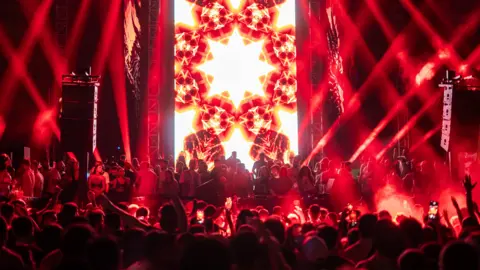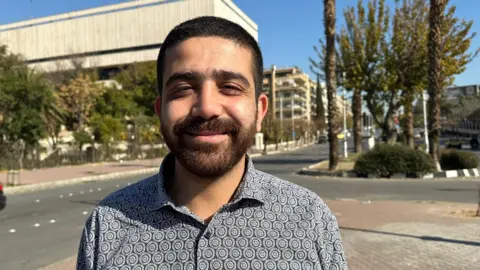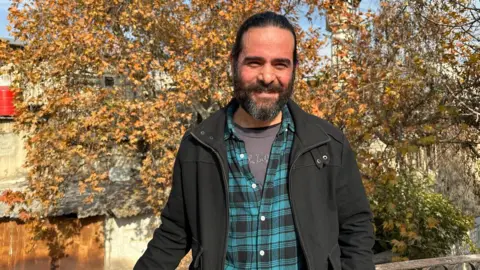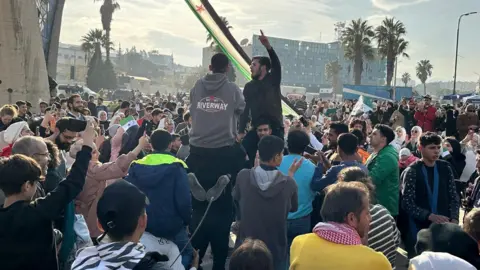 It's an experience
It's an experienceIn the midst of the struggle for a new Syria, the country's musicians are eyeing the Islamist rebel leadership warily and hoping to build on hard-won gains made during the nearly 14-year civil war.
The conflict gave energy and focus to the nascent heavy metal scene.
As the fighting subsided, a thriving electronic music and dance show industry rose from the ashes, leading to a revival of Syria's nightlife.
Its members are now preparing to turn to a government led by Hayat Tahrir al-Sham, or HTS, a group with roots in al-Qaida and the Islamic State.
“We have to be organized before we go to them because they are so organized,” said DJ and musician Maher Green. “We are ready to talk to them with logic. We are ready to talk to them with a real offer.”
Electronic music promoters found a way to talk to the security services working for the former president, Green said.
“They didn't understand getting 50 guys and girls together and dancing in such a goofy way,” he said. “We have developed a relationship with them over the years to go along in a good and peaceful way.”

The Assad regime was less tolerant of heavy metal rockers who founded underground bands in the late 1990s and early 2000s.
They saw it as a subversive Western subculture associated with Satanism.
“I went to the intelligence forces maybe three times just because I was selling that kind of music,” said Nael al-Hadidi, who owns a music store. “They made me sign some papers saying I wouldn't do it again.
The observation changed when the brutal suppression of Syria's pro-democracy revolution sparked a bloody civil war.
“Before the war, even if you let your hair grow long, wear black T-shirts, metal T-shirts for dancing, the guards would pick you up. They suspect you are a Satanist or something,” al-Hadidi said.
“After the war started, they were too busy to dig like that. They were more afraid of the political stuff.”
This opened space for the emergence of a vibrant heavy metal scene, the subject of a documentary by Monzer Darwish called Syrian Metal is War.
The war may have energized metal bands, but it ultimately led to a mass exodus of musicians who felt the country no longer offered a future.
“Ninety percent of my friends are now in Europe, Holland and Germany,” al-Hadidi said, shaking his head.
Wajd Khair is a musician who stayed but gave up music in 2011 when the killings started.
“It seemed that no matter what lyrics I wrote, they didn't express what really happened, no words could express what was happening then,” he told me.

Last year, Khair finally started playing and recording again. Now he wonders what Islamist leadership means for creative freedom.
“We have to be bolder,” he said, when asked if he would stay off the air until the situation was clearer.
“We need to be heard. We need to let everyone know we're here. We exist. It's not just “Islamic Front” and “Islamic State” here. I don't think keeping a hidden place under these circumstances is good for anyone.”
Khair was encouraged by the pragmatism demonstrated in the days following the rebel takeover. “The indicators are that we're going to a better place, hopefully,” he said.
But while he was talking we heard that the HTS had closed the Opera House. “Not a good sign,” if true, Khair exclaimed.
We rushed to the site only to be told by officials outside that it was a false alarm that the venerable institution would open a week after the rebels were defeated along with other public buildings.
HTS certainly promises to respect rights and freedoms, saying it has long since broken with its extremist past.
He seems sensitive to the cosmopolitan culture of Damascus. State television began broadcasting Islamic chants last week, but pulled it less than 24 hours later when social media erupted in protests.

In the square in front of the Opera House, Safana Bakle tried to perform revolutionary songs with the people she led. Joined by enthusiastic youths, she handed over her drum and let them chant and sing.
“It might not be an easy road,” she said. “Maybe we will have new obstacles, but before we had corruption, dictatorship, secret police. We still have a lot of hope for the future … because we have a very, very large group of people that is the opposition and artists and actors and musicians and composers and the future of Syria.”
But they don't want to replace political authoritarianism with religious fundamentalism, al-Hadidi said.
“I hope HTS stands behind its words about freedom because we don't want to be another Afghanistan or another country ruled by a certain party or rulers who force you to (follow) some rules.”
Determined to remain a part of Syria's future, Green said it was important for the artistic community to act quickly.
“It does not seem that in the first week of the liberation of Syria (HTS) is ready to seek the cultural side. They have a lot of problems, they are looking at the economy, they are looking to make a new government,” he said.
“We're trying to organize before they start looking at the culture. So we get there first, (and we have to be) united in our opinions.”
Like others here, Green experimented, mixing traditional Arabic music with electronic beats.
The Islamist insurgent culture “is religious songs and that's it,” he said.
“It's a little bit backwards for us. We were here in Syria before the war and inside during the war, (when) we had so many experiments. We have evolved so much. We have so much mixed culture.'
Syria's music scene has revived and even thrived during the civil war – now it faces a new and unexpected challenge.

